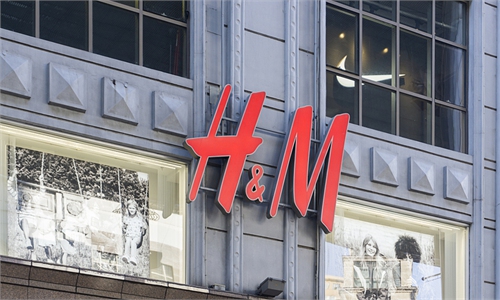
An Anta Sports store Photo: VCG
Chinese sports-wear maker Anta Sports announced on Wednesday that it is starting the process to quit the Better Cotton Initiative (BCI), a Switzerland-based cotton organization, and will continue to use cotton produced from Northwest China's Xinjiang Uygur Autonomous Region.The company's announcement came after the BCI decided to suspend licensing of BCI cotton from Xinjiang on the ground that it has become increasingly difficult to conduct credible due diligence in the region, echoing Western accusation of labor abuse in the region.
Chinese Foreign Ministry has strong denied the accusations, saying the presumptuous claims of "genocide" or "forced labor" are made-up lies, and belong to ugly farces concocted by a few Western politicians, media practitioners and scholars in Western countries who try to smear China.
On Monday, China decided to sanction 10 individuals and four entities in EU that severely harm China's sovereignty and interests and maliciously spread lies and disinformation, after EU imposed unilateral sanctions on Chinese individuals and entity.
"We have noticed the BCI's statement. We are deeply concerned about the matter and is starting the process to exit the organization," Anta said in the statement.
"As a company that is devoted to environment protection, Anta became a member of the BCI. The purpose of our cooperation was to promote the sustainable development of global cotton farming and supply for cotton farmers and environment protection," the company said.
"We have been purchasing and using cotton produced from China including Xinjiang region, and we will continue to purchase and use cotton from China," the statement said.
According to the BCI's official website, the organization has 2,100 members worldwide, of which nearly 500 are from China, including five retailers and brands, 485 suppliers and manufacturers.
Uproar with retailer H&M boiled on Chinese social media on Wednesday as the company said in a statement that they do not work with any garment manufacturing factories located in Xinjiang and will not source cotton from there.
In a statement, H&M said that as the BCI has suspended licensing of BCI cotton in Xinjiang, H&M's production will no longer be sourced from Xinjiang.
H&M's ill-willed statement immediately angered Chinese netizens who called for a boycott of H&M in China, and some simply asked the brand to "get out of China market."
"The BCI made a very wrong judgment based on false information and lies. H&M's statement is based on that wrong judgment, which has caused broad discontent from Chinese netizens. It shows it is not that the Chinese people do not want human rights, but they resolutely oppose outright lies," said Shen Yi, a professor at the School of International Relations and Public Affairs of Fudan University.
"They might not make such a mistake if they had visited Xinjiang in person."
"Why the Western world has such PITS feeling on cotton is somehow instigated by the US. They hold a biased stereotype of China," Shen added

